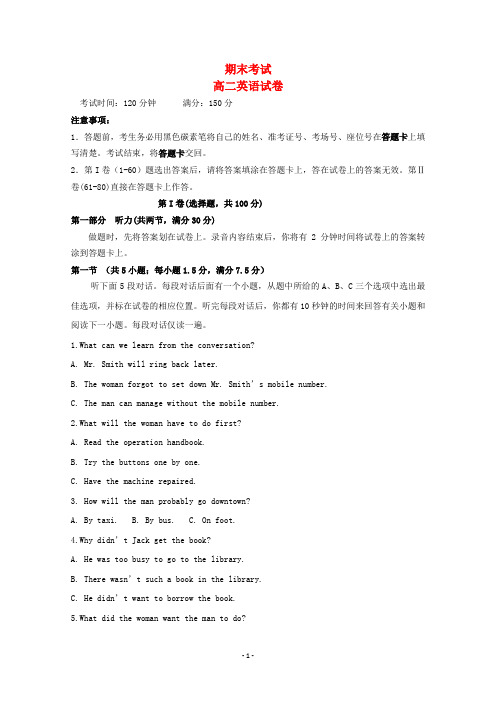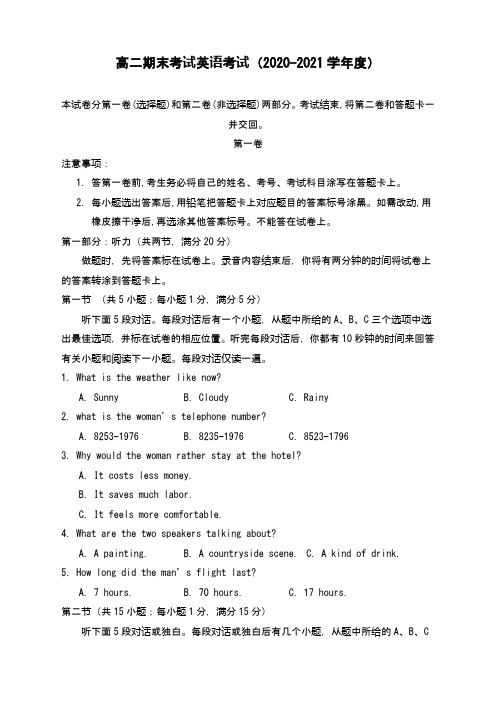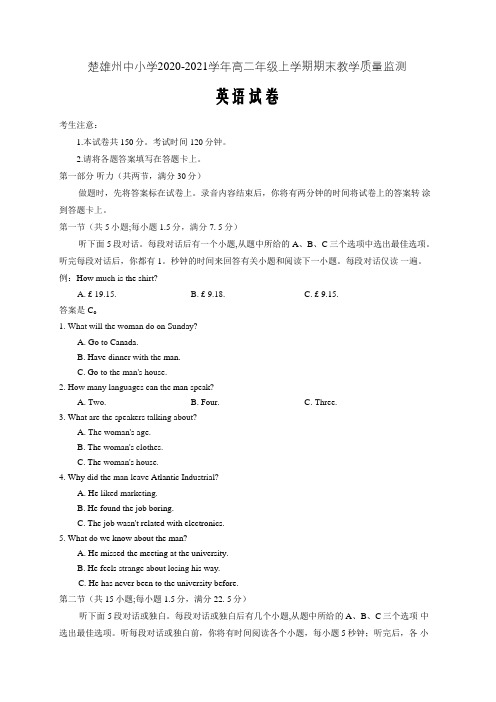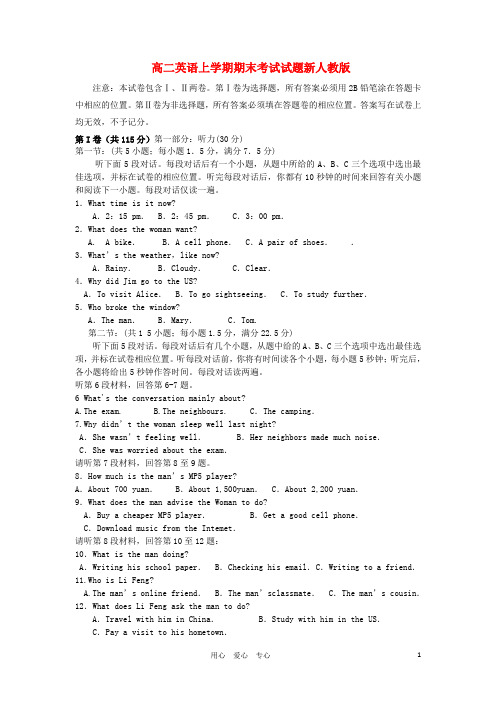云南省2020学年高二英语上学期期末考试试题
- 格式:doc
- 大小:126.50 KB
- 文档页数:11

期末考试高二英语试卷考试时间:120分钟满分:150分注意事项:1.答题前,考生务必用黑色碳素笔将自己的姓名、准考证号、考场号、座位号在答题卡上填写清楚。
考试结束,将答题卡交回。
2.第I卷(1-60)题选出答案后,请将答案填涂在答题卡上,答在试卷上的答案无效。
第Ⅱ卷(61-80)直接在答题卡上作答。
第I卷(选择题,共100分)第一部分听力(共两节,满分30分)做题时,先将答案划在试卷上。
录音内容结束后,你将有2分钟时间将试卷上的答案转涂到答题卡上。
第一节(共5小题;每小题1.5分,满分7.5分)听下面5段对话。
每段对话后面有一个小题,从题中所给的A、B、C三个选项中选出最佳选项,并标在试卷的相应位置。
听完每段对话后,你都有10秒钟的时间来回答有关小题和阅读下一小题。
每段对话仅读一遍。
1.What can we learn from the conversation?A. Mr. Smith will ring back later.B. The woman forgot to set down Mr. Smith’s mobile nu mber.C. The man can manage without the mobile number.2.What will the woman have to do first?A. Read the operation handbook.B. Try the buttons one by one.C. Have the machine repaired.3. How will the man probably go downtown?A. By taxi.B. By bus.C. On foot.4.Why didn’t Jack get the book?A. He was too busy to go to the library.B. There wasn’t such a book in the library.C. He didn’t want to borrow the book.5.What did the woman want the man to do?A. To go along to meet her friend with her.B. To do the woman’s work.C. To meet Tony for her.第二节(共15小题;每小题1.5分,满分22.5分)听下面5段对话或独白。

高二第一学期期末英语考试(2020-2021学年度)本试卷分第Ⅰ卷(选择题)和第Ⅱ卷(非选择题)两部分。
满分为150分,考试用时120分钟。
第Ⅰ卷(三部分,共105分)注意事项:1.答第Ⅰ卷前,考生务必将自己的姓名、准考证号、考试科目、试卷类型用铅笔涂写在答题卡上。
2.每小题选出答案后,用铅笔把答题卡上对应题目的答案标号涂黑,如需改动,用橡皮擦干净后。
再选涂其他答案标号。
第一部分:听力(共两节,满分30分)第一节(共5小题;每小题1.5分,满分7.5分)听下面5段对话。
每段对话后有一个小题,从题中所给的A、B、C三个选项中选出最佳选项,并标在试卷的相应位置。
听完每段对话后,你都有10秒钟的时间来回答有关小题和阅读下一小题。
每段对话仅读一遍。
1. When will the speakers meet?A. Next Monday.B. On Sunday.C. Tomorrow.2. What happened to the woman?A. A thief broke into her garden.B. One of her windows was broken.C. Some of her money was stolen.3. What will the woman most probably buy?A. Pears.B. Bananas.C. Cherries.4. What time will the plane to Milan leave?A. At 7:15B. At 8:15C. At 9:155. What can we learn from the conversation?A. Robert bought a new car.B. The woman was good at driving.C. Robert taught the woman to drive a car.第二节(共15个小题}每小题1.5分,满分22.5分)听下面5段对话或独白。

高二期末考试英语考试(2020-2021学年度)本试卷分第一卷(选择题)和第二卷(非选择题)两部分。
考试结束,将第二卷和答题卡一并交回。
第一卷注意事项:1.答第一卷前,考生务必将自己的姓名、考号、考试科目涂写在答题卡上。
2.每小题选出答案后,用铅笔把答题卡上对应题目的答案标号涂黑。
如需改动,用橡皮擦干净后,再选涂其他答案标号。
不能答在试卷上。
第一部分:听力(共两节,满分20分)做题时,先将答案标在试卷上。
录音内容结束后,你将有两分钟的时间将试卷上的答案转涂到答题卡上。
第一节(共5小题;每小题1分,满分5分)听下面5段对话。
每段对话后有一个小题,从题中所给的A、B、C三个选项中选出最佳选项,并标在试卷的相应位置。
听完每段对话后,你都有10秒钟的时间来回答有关小题和阅读下一小题。
每段对话仅读一遍。
1.What is the weather like now?A.Sunny B.Cloudy C.Rainy2.what is the woman’s telephone number?A.8253-1976 B.8235-1976 C.8523-17963.Why would the woman rather stay at the hotel?A.It costs less money.B.It saves much labor.C.It feels more comfortable.4.What are the two speakers talking about?A.A painting. B.A countryside scene. C.A kind of drink. 5.How long did the man’s flight last?A.7 hours. B.70 hours. C.17 hours.第二节(共15小题;每小题1分,满分15分)听下面5段对话或独白。
每段对话或独白后有几个小题,从题中所给的A、B、C三个选项中选出最佳选项,并标在试卷的相应位置。

楚雄州中小学2020-2021学年高二年级上学期期末教学质量监测英语试卷考生注意:1.本试卷共150分。
考试时间120分钟。
2.请将各题答案填写在答题卡上。
第一部分听力(共两节,满分30分)做题时,先将答案标在试卷上。
录音内容结束后,你将有两分钟的时间将试卷上的答案转涂到答题卡上。
第一节(共5小题;每小题1.5分,满分7. 5分)听下面5段对话。
每段对话后有一个小题,从题中所给的A、B、C三个选项中选出最佳选项。
听完每段对话后,你都有1。
秒钟的时间来回答有关小题和阅读下一小题。
每段对话仅读一遍。
例:How much is the shirt?A. £19.15.B. £9.18.C. £ 9.15.答案是C o1. What will the woman do on Sunday?A. Go to Canada.B. Have dinner with the man.C. Go to the man's house.2. How many languages can the man speak?A. Two.B. Four.C. Three.3. What are the speakers talking about?A. The woman's age.B. The woman's clothes.C. The woman's house.4. Why did the man leave Atlantic Industrial?A. He liked marketing.B. He found the job boring.C. The job wasn't related with electronics.5. What do we know about the man?A. He missed the meeting at the university.B. He feels strange about losing his way.C. He has never been to the university before.第二节(共15小题;每小题1.5分,满分22. 5分)听下面5段对话或独白。

云南省昆明市云南师大实验中学2020年高二英语期末试卷含解析一、选择题1. John plays football ______,if not better than,David.A. as wellB. as well asC. so wellD. so well as参考答案:B2. —Did you receive the letter the next day?—No. Somehow, it was three weeks I received it.A. sinceB. whenC. thatD. before参考答案:D3. The lack of eco-friendly habits among the public is thought to be a major of global climate change.A. resultB. reflectionC. warningD. cause参考答案:D句意:缺乏环保习惯被公众认为是引起全球气候变化的主要原因。
result 意为“结果”;reflection意为“反射;回响;warning 意为“警告”;cause 意为“原因”。
根据语境,选D。
【考点】考查名词4. The salesman scolded the girl caught ____ and let her off.A.to have stolen B.stealing C.to steal D.to be stealing参考答案:B5. At first, his teacher couldn’t realize that Lang Lang had a _______ for music though he wanted to learn the piano so much.A. knowledgeB. presentC. giftD. patience参考答案:C略6. —Ken, why do you look so tired?—I _______ myself ______ the climate since I came here.A. hadn’t adapted; toB. haven’t adapted; toC. don’t adapt; fromD. didn’t adapt; from参考答案:B略7. As it is known to all,________ attention you pay to your spelling,________ mistakes you might make.A. the less; the lessB. the less; the fewerC. the less; the moreD. the more; the more参考答案:C35. The wet weather will continue tomorrow, when a cold front _____to arrive.A. expectsB. is expectingC. is expectedD. will be expected参考答案:c略9. Some of the old________about the space age are coming true.A. fantasiesB. delusionsC. nightmaresD. impressions参考答案:A句意:一些有关太空时代的古老幻想正在变成现实。

高二英语上学期期末考试试题新人教版注意:本试卷包含Ⅰ、Ⅱ两卷。
第Ⅰ卷为选择题,所有答案必须用2B铅笔涂在答题卡中相应的位置。
第Ⅱ卷为非选择题,所有答案必须填在答题卷的相应位置。
答案写在试卷上均无效,不予记分。
第I卷(共115分)第一部分:听力(30分)第一节:(共5小题;每小题1.5分,满分7.5分)听下面5段对话。
每段对话后有一个小题,从题中所给的A、B、C三个选项中选出最佳选项,并标在试卷的相应位置。
听完每段对话后,你都有10秒钟的时间来回答有关小题和阅读下一小题。
每段对话仅读一遍。
1.What time is it now?A.2:15 pm. B.2:45 pm. C.3:00 pm.2.What does the woman want?A. A bike. B.A cell phone. C.A pair of shoes..3.What’s the weather,like now?A.Rainy. B.Cloudy. C.Clear.4.Why did Jim go to the US?A.To visit Alice. B.To go sightseeing. C.To study further.5.Who broke the window?A.The man. B.Mary. C.Tom.第二节:(共1 5小题;每小题1.5分,满分22.5分)听下面5段对话。
每段对话后有几个小题,从题中给的A、B、C三个选项中选出最佳选项,并标在试卷相应位置。
听每段对话前,你将有时间读各个小题,每小题5秒钟;听完后,各小题将给出5秒钟作答时间。
每段对话读两遍。
听第6段材料,回答第6-7题。
6 What's the conversation mainly about?A.The exam.B.The neighbours. C.The camping.7.Why didn’t the woman sleep well last night?A.She wasn’t feeling well. B.Her neighbors made much noise.C.She was worried about the exam.请听第7段材料,回答第8至9题。
I. 听力(共两节,总分值20分)第一节听力理解(5段共15小题;每题1分,总分值15分)每段播放两遍。
各段后有几个小题,各段播放前每题有5秒钟的阅题时间。
请根据各段播放内容及其相关小题,从题中所给的A、B、C项中,选出最正确选项,并在答题卡上将该项涂黑。
听第一段对话,回答第1—3题。
1. Where does the conversation take place?A. At the waiting room.B. At the ticket office.C. At the station entrance.2. When does the bus usually leave?A. At a quarter past two.B. At two o’clock sharp.C. At half past two.3. What does the driver usually do before the bus starts out?A. Check the passengers’ tickets.B. Get the passenger s’ things on the bus.C. Carry the passengers’ suitcases for them.听第二段对话,回答第4—6题。
4.What do we know about the man?A. He has been to New York.B. He has lost his job.C. He’s on business.5. How long haven’t the two speakers seen each other?A. For two days.B. For a week.C. For a month.6. Why was the man eager to see the woman?A. To turn to her.B. To make the suggestion.C. To tellhis story.听第三段对话,回答第7—9题。
云南高二高中英语期末考试班级:___________ 姓名:___________ 分数:___________一、单项选择1.My mother always tells me ______ out alone at night.A.go B.not go C.not to go D.don’t go 2.It’s hot here. Why not ________your coat?A.put on B.dress up C.try on D.take off 3.--- I’m going to Yulong Snow Mountain tomorrow?--- ----------A.Have a good trip B.It’s my pleasureC.No way D.It’s hard to say4.--- Must I stay at home, Mum?--- No, you_____A.needn’t B.mustn’t C.don’t D.may not 5.Love is ______ way of life,but not _____ aim of it.A.the , the B.a , the C.a, an D.the, an6._______ breaks the law should be punished .A.Those who B.Whomever C.No mattter who D.Whoever 7.We are living in an age _______ many things are done on computers.A.which B.that C.whose D.when8.Students should _______ everything important that their teachers give in class.A.set up B.set down C.set aside D.set out9.You can’t imagine what difficulty we had_______ home in the snowstorm.A.walking B.walk C.to walk D.walked 10.-----Did you watch the movie After Shock last night ?----- I had planed to , but it _______ hard all the time .A.is raining B.was raining C.had rained D.has rained 11.---Who called just now?---I don’t know because I didn’t______ his voice.A.listen B.recognize C.get to know D.realize 12.Many students believe the choice of their courses and universities should____ __ their own interest. A.be based on B.base on C.be basing on D.base at13.The examination was very easy. ________, our monitor didn’t pass it.A.In other words B.What’s moreC.Believe it or not D.All the same14.---It’s a long time since I saw my sister.---______ her this weekend?A.Why not visit B.Why not to visitC.Why not visiting D.Why don’t visit15.It was in New Zealand _______Elizabeth first met Mr Smith .A.that B.how C.which D.when16.Make sure you’ve got the passports and tickets and _______ before you leave.A.something B.anything C.everything D.nothing17.---- Where does Mr. Black live ? Can you guess?----- Sorry, I can’t guess ________.A.where does he live B.where he lives inC.where does he live in D.where he lives18.Many beautiful fish are disappearing____ the severe(严重的) pollution.A.because of B.because C.so D.thanks of19.---Do you think it’s a good idea to make friends with your students?---_____, I do. I think it’s a great idea.A.Really B.Obviously C.Actually D.Generally20.We haven’t dicussed yet _______ we are going to place our new furniture.A.that B.which C.what D.where二、完形填空阅读短文,根据短文内容从A、B、C、D四个选项中选出最佳答案。
高二(上)英语期末答案第一部分听力(满分30分)1~5 BABAC 6~7 CA 8~10 BAC 11~13 BAA 14~17 CBCC 18~20 BCA第二部分英语知识运用(共两节,满分40分)阅读理解(满分40分)21~24 DBC 25~27 ABCB 28~31.CABA 32~35 BCAA 36~40 BCEDFA:【解析】本文是一篇应用文,介绍了北京的风景,文化,历史,当地人的生活方式和特点,帮助更好的访问北京。
21. D 根据第一段中的“The 4-day classic Beijing tour is designed for tourists who come to visit China for the first time”(4天经典北京游是专为第一次来中国的游客设计的)可知,这则广告的目标人群是刚来中国的外国人。
故选D。
22. B 根据Day 2: The Great Wall & the Summer Palace部分中的“Suggested activity: Beijing opera shows (Liyuan Theatre, 19:30—20:30 every evening) ”可知,每天晚上19:30到20:30在Liyuan Theatre有京剧表演。
如果游客想要欣赏京剧就可以去Liyuan Theatre。
故选B。
23. C 根据Day 3: Beijing city sightseeing & the local experience部分中的“Hutong visit: see some traditional arts of the old Beijing, such as paper cutting and kite making, and visit a local family”(参观胡同:参观老北京的一些传统艺术,如剪纸、风筝制作,并拜访当地家庭)可知,在第三天,游客可以欣赏北京的传统艺术,如剪纸、风筝,也可以深入当地家庭,了解当地人的生活方式。
上学期期末水平测试高二年级英语试卷(满分:150分时间:120分钟)第一部分听力(共两节,满分30分)第一节(共5小题,每小题1.5分,满分7.5分)听下面 5 段对话。
每段对话后有一个小题,从题中所给的 A、B、C 三个选项中选出最佳选项,并标在试卷的相应位置。
听完每段对话后,你都有 10 秒钟的时间来回答有关小题和阅读下一小题。
每段对话仅读一遍。
1. Where is the woman’s mobile phone?A. On the chair.B. In her bag.C. Behind the chair.2. What can we know from the conversation?A. The man was also excited last night.B. The woman got her passport.C. The man received a plane ticket.3. When may the woman take her computer back?A. In a month.B. In a week.C. Tomorrow.4. How much does the man have with him?A.£1000.B.£3000.C.£4000.5. How does the man feel about the interview?A. DisappointedB. Worried.C. Confident.第二节(共15小题;每小题1.5分,满分22.5分)听下面5段对话或独白。
每段对话或独白后有几个小题,从题中所给的A、B、C三个选项中选出最佳选项,并标在试卷的相应位置。
听每段对话或独白前,你将有时间阅读各个小题,每小题5秒钟;听完后,各小题给出5秒钟的作答时间。
每段对话或独白读两遍听第6段材料,回答第6至8题。
6. Which month is it now?A. September.B. October.C.November.7. Where is the woman from?A.China.B. Japan.C. Canada.8. What will the woman probably do next week?A. See a film.B. Attend a party.C. Buy a dress 听第7段材料,回答第9至11题。
9. When does the conversation take place?A. At the beginning of the term.B. In the middle of the term.C. At the end of the term.10. Where did the woman grow up?A. In England.B.In America.C. In France.11. What's the woman's father?A. A doctor.B. A professor.C. An artist.听第8段材料,回答第12至14题。
12.What season is it now?A. Spring.B. Summer.C. Autumn.13. Who will go to Lushan Mountain with the man?A. The woman.B. His parents.C. His brother.14.What are the speakers going to do?A. Go shoping.B. Go to the man’s house.C. Book train tickets.听第9段材料,回答第15至17题。
15. What do we know about the man?A. He dislikes dogs.B. He loves dogs.C. He loves cats.16. What does the man suggest doing on the weekend?A. Riding a horse.B. Walking dogs.C. Watching a movie.17. How many kinds of animals do the speakers mention?A.Two.B.Three.C.Four.听第10段材料,回答第18至20题。
18. How long does the museum open every day in winter?A. Six hours.B. Seven hours.C. Nine hours.19. How much will a family pay for the spccial ticket?A.£4.50.B.£6.C.£18.20. What do we know about the museum?A. It is closed on Mondays.B. It's the biggest air museum in America.C. It's not far from the village of Cherford.第二部分:阅读理解(共两节,满分 40 分)第一节(共 15 个小题;每小题 2 分,满分 30 分)阅读下列短文,从每题所给的四个选项(A、B、C 和 D)中,选出最佳选项,并在答题卡上将该项涂黑。
AWhere to stay in Boswell? The following are some choices for you:21. If a Japanese traveller likes to eat in French restaurant, _______ is the right place for him to go to.A. 233 EdwardRoad B. 1264 Venning RoadC. 222 EdwardRoad D. 12 9 North Road22. Which hotel faces the Orchard Hotel?A. The FirstHotel B. The OsakaHotelC. The FairviewHotel D. No Hotel23. If you want to book a cheapest single room, which number will you call?A. 414-6433B. 591-5620C. 641-6641 D. 643-8206BWhy do we like drinking water from plastic bottles(塑料瓶)? Some people think it is healthy and clean. Others drink bottled water because it’s easy — you can carry it around with you. In hot countries, like Greece, we often buy bottles of cold water in the summer.However, making lots of plastic is not a good idea for many reasons. First of all, we need a lot of oil for plastic products. We usually use oil as a source of energy. If we reduced the number of bottles we made, we wouldn’t need so much oil. Plastic bottles also pollute the environment. If we reused all our plastic bottles, we wouldn’t need so much space for rubbish dumps.But in Greece, we don’t reuse much of the plastic we use. In 2006, Greeks reused only about 10% of plastic waste. The rest became rubbish on land and in rivers and seas.So next time you want to throw away a plastic bottle in the litter bin, stop and think. If you reuse it, you would help the environment. But what can you do when there isn’t a bin near you? Well, there are lots of useful w ays that you can use your bottles again. For example, an empty bottle makes a great piggy bank for your pocket money, and if you cut a bottle in half, you will have a plant pot. Go green! You can makea difference.24. What is not mentioned about bottled water in this passage?A. It’s healthy.B.It’s clean.C.It’s easy.D.It’s expensive.25. Plastic products are made from ________.A. energyB. oilC. rubbishD. plants26. Which is the best way to deal with used plastic bottles?A. To reuse them.B. To make a piggy bank.C. To make a plant pot.D. To drop them into the river.27. The underlined part in this passage tells us “_____”.A. To make a different life, you’d better go outsid e.B. To look different, you’d better wear green clothes.C. To protect the environment, you can do something.D. To go green, you should use plastic products.CI was sitting in my kitchen. My mom stood in front of me, hardly keeping the tears from spilling over. She told me that my three-year-old cousin had cancer. Hearing this, I went completely numb. How could this be happening? I had just seen her, and she was fine.These things didn’t happen to our family, that’s what my uncle said. It seemed like the world turned upside down; just last week my grandmother had passed away.I felt like I couldn’t get my feet on solid ground.That’s when my sister, Madi, came down the stairs with her long brown hair freshly washed. She sat next to me and smiled. Despite what was happening, everything would work out, her smile seemed to say.“Mom, do you think I could get my hair cut tomorrow?” Madi asked.“Sure,” Mom said, starting to wash the dishes.“I want to donate it to Locks of Love” Madi smiled.My mom stopped wash ing and turned to look at her. “Are you sure?” I noticed that Mom was holding back tears. This was a sacrifice(牺牲) for Madi. Her long hair was an important part of her.“Yeah, it’s just hair. Eventually it will grow back.” She said.“All right,” Mom said q uietly, smiling again.Madi gave up a part of herself for a while. She let a piece of herself go to someone else, someone she didn’t know. That day she became my hero too.28. On hearing 3-year-old cousin had cancer, how did the author feel?A. PuzzledB. ShockC. AfraidD. Worried29. What can we know from Paragraph 2?A. The world is unfair to the writer’s family.B. Unlucky things didn’t happen to the writer’s family.C. The writer had the disability with her legs.D. Unlucky things of the family made the writer very sad.30. Where did the conversation happen?A. In the living roomB. In the kitchenC. In the bedroomD. On the street31. What can we know about Madi?A. She was kind and willing to help others.B. She liked smiling, but didn’t love cooking.C. She made her mother regret her hair.D. She didn’t like wearing long hair again.DYounger students experience school bullying (欺凌) more frequently than older ones, and male students are bullied more than their female peers, a survey found.It also found that nearly half of students had been intentionally hit or knocked down by classmates. About 6 percent said they are targeted by bullies on campus every day. The survey also found that students from ordinary schools experienced more bullying than peers from key institutions, and children from poor families are more likely to be bullied at school.Being bullied can have a negative impact on a child’s personal development and academic performance, according to Zhou Jinyan, a researcher who led the study at Beijing Normal University. “Children being bullied will find it hard to trust others,” Zhou said. “They may often feel anxiety, anger, resentment or depression. These emotions will further undermine their ability to control their own life.”In recent years, bullying on Chinese campuses has been frequently reported and has attracted widespread attention and concern. The most recent incident to arouse heated discussions took place in December at Beijing’s Zhongguancun No.2 Primary School. A fourth-grade student was bullied and laughed at by classmates, causing him acute stress disorder.The Supreme People’s Procuratorate (最高人民检察院) received about 1,900 cases related to school bullying in 2016. Meanwhile, there was a notable increase in bullying reports involving middle school students from 14 to 18 years old.Zhou came up with some ways to solve the problem, including boosting communication between teachers, parents and students and trying to establish more harmonious relationships among children. She said it was strongly suggested that parents try to be involved in their children’s educational experience, as theirpresence and companionship have proved effective in reducing bullying and its negative effects.32. Who is the most likely to become the target of bullying?A. A 10-year-old boy from a poor familyB. A 17-year-old boy from a rich familyC. A 17-year-old girl from an ordinary schoolD. A 10-year-old girl from a key school33. Being bullied will cause students to go through the following EXCEPT _____.A. a lack of trust in other peopleB. a drop in the sense of depressionC. a lack of confidence in themselvesD. a drop in academic performance34. We can learn from the text that _____.A. bullying on campus has been brought into sharp focus by the mediaB. students who enjoy parents’ companionship will be bullying-freeC. the government should consider taking further action against bullying at schoolD. bullying at school usually leads to acute stress disorder35. What can be the best title for the text?A. Negative effects on children caused by bullyingB. Is anything we can do about bullying?C. The reasons for bullying on campusD. Bullying affects half of students第二节七选五 (共5小题;每小题2分,满分10分)根据短文内容,从短文后的选项中选出能填入空白处的最佳选项。